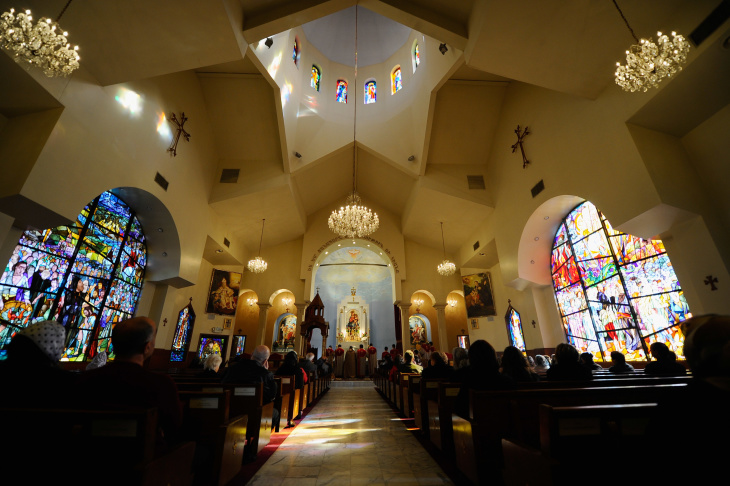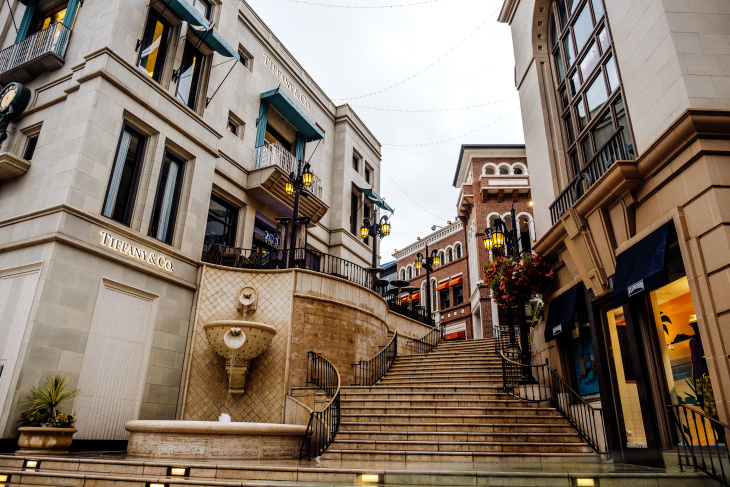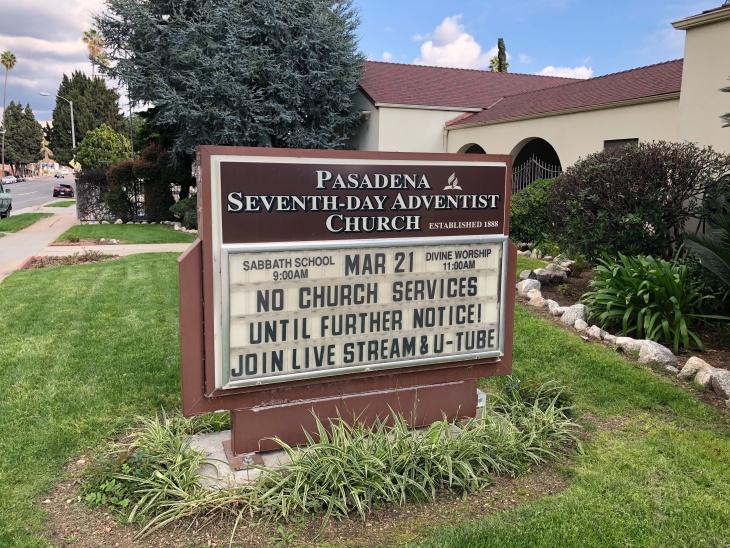
Our news is free on LAist. To make sure you get our coverage: Sign up for our daily coronavirus newsletter. To support our non-profit public service journalism: Donate Now.
The California Department of Public Health announced on Memorial Day that churches, temples, mosques and other places of worship have permission to reopen statewide. In-store retail also got the greenlight to reopen, with restrictions.
The new guidelines apply to the entire state, but are subject to approval by each county's public health department. That means they don't yet apply to Los Angeles County, although some county supervisors are pushing to open up as soon as possible.
Riverside County has already approved the change, allowing religious services to resume immediately.
"A cornerstone of many religions is to take care of each other. Let's continue to take care of each other by praying and observing six feet apart," Riverside County Board of Supervisors Chair Victor Manuel Perez said in a statement.
The news comes just three days after the Ninth Circuit Court of Appeals upheld Gov. Newsom's ban on in-person church services.
The Governor had said he planned to loosen restrictions on churches and religious gatherings in the coming days, although church services were not initially supposed to resume until the third phase of reopening.
NEW GUIDELINES FOR RELIGIOUS INSTITUTIONS
Places of worship can now hold religious services and funerals that limit attendance to 25% of a building's capacity (or up to 100 attendees, whichever is lower). That again, is subject to individual county approval.
According to the guidelines, in order to reopen, places of worship must "establish and implement" a prevention plan for the spread of COVID-19 and train staff on the plan. Religious institutions must also set physical distancing guidelines, and implement strict cleaning and disinfecting protocols.
The guidelines recommend that staff and guests wear face coverings, but don't require it. They also recommend (but don't require) church staff to have their temperatures and symptoms checked before they begin their shifts.
Public health officials advise religious leaders to "consider eliminating singing and group recitations," as these activites are thought to increase transmission of the coronavirus. That's likely a response to a major outbreak that happened at a church just north of Seattle after 61 singers gathered for choir practice in March. Over 50 members of the choir later tested positive for the coronavirus; two died.
Shortly after, the CDC published a study saying that singing in a group could increase transmission of the virus. Choir practice and performances could count as "superspreader" events:
"Aerosol emission during speech has been correlated with loudness of vocalization, and certain persons, who release an order of magnitude more particles than their peers, have been referred to as superemitters and have been hypothesized to contribute to superspeading events."

IN-PERSON SHOPPING
All retail businesses can now reopen for in-person shopping statewide, pending county approval. Social distancing, face coverings and employee screenings are recommended as part of the state's guidelines.
However, barbershops, hair and nail salons must still remain closed.
Some California counties have already approved in-person retail — including Riverside, San Bernardino, Ventura and Orange Counties.
The California Department of Public Health plans to reevaluate the guidelines in 21 days, which accounts for seven days of reopening time and the 14-day incubation period of the virus.
L.A. County Supervisor Janice Hahn had recently pushed for all retail to be allowed to reopen, arguing that it was unfair to allow big box stores like Target and Walmart to offer in-person shopping while forcing small stores to operate with curbside pick-up only.
The L.A. County Board of Supervisors is expected to vote Tuesday on whether to take steps to allow businesses to reopen.
State officials cautioned the public not to let the reopenings affect the way they evaluate the risks of the virus.
"Together, our actions have helped bend the curve and reduce infections in our state. As sectors continue to open with changes that aim to lower risk, remember that COVID-19 is still present in our communities," Dr. Sonia Angell, Director of the California Department of Public Health, said in a news release.

TRUMP: 'WE NEED MORE PRAYER, NOT LESS'
The move to open places of worship in California comes just a few days after President Donald Trump said churches, mosques and synagogues should be considered "essential." He ordered states to let them reopen before the holiday weekend.
The President even threatened to override state guidelines if local leaders didn't comply. "I will override the governors," he said. "In America, we need more prayer, not less." It's not clear whether or not he has the authority to follow through on his threat.
On May 19, the Justice Department directly warned Newsom in a letter that his order to keep churches closed might qualify as discrimination against religious groups. The letter, written by the head of the department's civil right's division, said Newsom was engaging in "unequal treatment of faith communities," by allowing some businesses like restaurants and retailers to re-open in Phase 2, while denying that right to churces.
Some suggested the President was responding to slipping poll numbers among his evangelical base, in addition to a decline in support from white Catholics. Recent polls showed both groups were experiencing a loss of confidence in the President's leadership, a red flag for his reelection prospects.
Several Republican leaders publicly supported the President's statement, according to Politico. "We have a right to worship," Sen. Rick Scott (R-Fla.) said Sunday on CNN, "Absolutely do I feel comfortable going to church."
PRESSURE FROM CHURCHES
Some church leaders have also been applying pressure on Gov. Newsom. Last week, more than a thousand pastors in California said they planned to defy the state's order if restrictions weren't lifted by the end of the month.
In a letter to Newsom, Robert H. Tyler, an attorney representing a Lodi church that previously sued the governor over the stay-at-home order, said he had the support of over a thousand religious leaders who argued that churches should be considered "essential," like grocery and hardware stores.
Some churches in California have ignored the governor's order all along. The L.A. Times reported that on Mother's Day a church in Butte County held an in-person service with about 180 attendees.
John MacArthur, a pastor at Grace Community Church in Sun Valley, announced that when he opens his church, attendees will not be wearing masks because "masks don't work." The megachurch usually hosts a crowd of some 3,000 worshippers.
IS IT SAFE?
So could opening churches and other venues for religious worship post a public health risk?
When U.S. District Judge John A. Mendez, who ruled in the state's favor in the Lodi case, wrote in the ruling that "during public health crises, new considerations come to bear, and government officials must ask whether even fundamental rights must give way to a deeper need to control the spread of infectious disease and protect the lives of society's most vulnerable."
The virus is known to spread more quickly in indoor spaces with limited airflow. And across the globe, religious gatherings have been sources of outbreaks.
In February, a 62-year-old woman with COVID-19 attended a church in Daegu, South Korea with 1,000 other worshippers, triggering an outbreak of infections.
Several days later, Christians from around the world gathered in a small town in France for an annual festival. That event has now been linked to aboout 2,500 global cases of coronavirus, in places as far as French Guyana, Burkino Faso and Switzerland. Reuters called it a "virus time bomb." Seventeen members of that congregation have since died.
Despite Trump's support, White House coronavirus coordinator Deborah Birx said yesterday that places of worship "may not be safe for those with preexisting conditions."
The CDC advises people gathering for worship to wash their hands, use disinfecting products like hand sanitizer and stay home when sick. The guidelines also encourage faith leaders to promote social distancing, in part by limiting the size of gatherings. Here are a few other guidelines for faith leaders from the CDC (there are many more):
- Clean and disinfect frequently touched surfaces at least daily and shared objects in between uses.
- Ensure that ventilation systems operate properly and increase circulation of outdoor air as much as possible by opening windows and doors, using fans, etc.
- If your faith community offers multiple services, consider scheduling services far enough apart to allow time for cleaning and disinfecting high-touch surfaces.
- Consider holding services and gatherings in a large, well-ventilated area or outdoors.
- Provide physical guides, such as tape on floors or walkways and signs on walls, to ensure that staff and children remain at least 6 feet apart.
The CDC also seems to be just as concerned as other government entities about infringing on religious freedom:
"This guidance is not intended to infringe on rights protected by the First Amendment to the U.S. Constitution or any other federal law, including the Religious Freedom Restoration Act of 1993 (RFRA). The federal government may not prescribe standards for interactions of faith communities in houses of worship, and in accordance with the First Amendment, no faith community should be asked to adopt any mitigation strategies that are more stringent than the mitigation strategies asked of similarly situated entities or activities."
In L.A. County, residents are required to wear face masks when they're out of their homes and interacting with people they don't live with. It's unclear if that order will apply to places of worship if and when the county gives them the green light to resume services.
Note: We have reached out to the L.A. County Department of Public Health for a statement (and thoughts on when L.A. might approve these changes). This post will be updated with that information, when provided.
Correction: A previous version of this story incorrectly stated the location and congregation size of Grace Community Church. LAist regrets the error.
MORE ABOUT LOCAL REOPENING EFFORTS:
"now" - Google News
May 26, 2020 at 06:44AM
https://ift.tt/3c4nSvr
Churches, In-Store Retail Can Now Reopen In California: Here's How It Happened - LAist
"now" - Google News
https://ift.tt/35sfxPY
Bagikan Berita Ini















0 Response to "Churches, In-Store Retail Can Now Reopen In California: Here's How It Happened - LAist"
Post a Comment